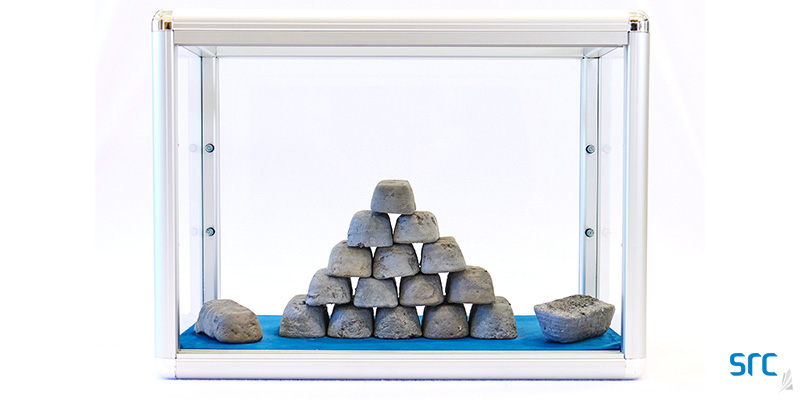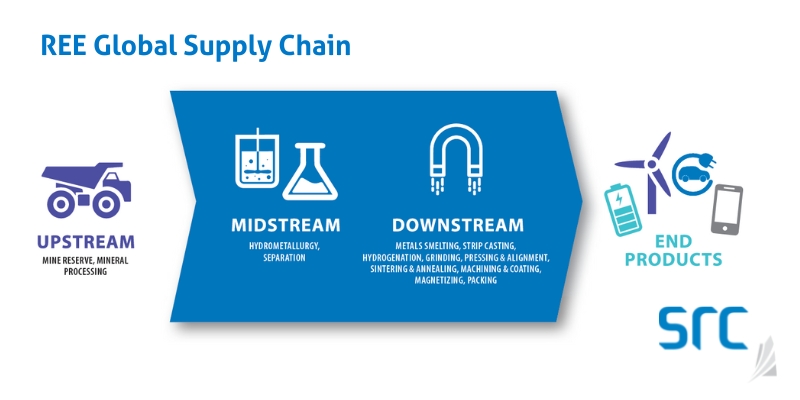With nearly 350 employees, $232 million in annual revenue and over 75 years of RD&D experience, SRC is Canada’s second largest research and technology organization with 1,600 clients in 22 countries around the world.

Saskatchewan Research Council
Editor’s note: Often behind the scenes, the Saskatchewan Research Council has provided substantial fundamental research to support Saskatchewan business, including the energy industry. Their work in oil and gas, from pipeline labs to reservoir modelling, is significant. Pipeline Online has invited the SRC to submit an occasional column, and this is their first piece, focusing on a key emerging market for Saskatchewan, rare earth elements.
By Jess Staffen
Metal smelting is one of the key parts of the rare earth element (REE) supply chain that is currently being developed by SRC. While the metal smelting process is not a new concept or practice, its use for REEs—especially in North America—is fairly recent.
Dr. Jack Zhang, Associate Vice-President of Strategic Initiatives at SRC, described his journey into the practice of metal smelting. “Metal smelting is one important part of extractive metallurgy. I have been working in extractive metallurgy for more than 15 years. However, most of my work has focused on mineral processing and hydrometallurgy. It was not until 2018 that I started to work on metal smelting technology, including both equipment development and process development.”
Since Dr. Zhang and his team began their work in metal smelting, they have made significant progress and have developed expertise in this niche area. In August 2022, SRC announced that it produced the first rare earth metal ingots in Canadian history at its under construction Rare Earth Processing Facility using metal smelting technology.
To date, 100 kg of NdPr (75% neodymium, 25% praseodymium) metal ingots have been produced. The Facility is the first of its kind in North America and includes three key stages of the REE midstream supply chain: concentration, separation and metal smelting. The Facility is on track to be commissioned and fully operational in 2024.
- 0113 Miller Epic Cinematic Hollywood trailer0113 Miller Epic Cinematic Hollywood trailer
- 0112 SASPO-2896_Right of Way_Awareness_20250112 SASPO-2896_Right of Way_Awareness_2025
- 0111 2026 SK Oil Show booth promo 010111 2026 SK Oil Show booth promo 01
- 0085 Turnbull snow removal call office0085 Turnbull snow removal call office
- 0110 SaskEnergy SEI_Network_Members_Burn_Brighter0110 SaskEnergy SEI_Network_Members_Burn_Brighter
- 0105 SaskEnergy Commitment to Safety0105 SaskEnergy Commitment to Safety
- 0102 Lori Carr Coal Extended0102 Lori Carr Coal Extended
- 0100 Turnbull Project Manager0100 Turnbull Project Manager
- 0099 Mryglod Steel 1080p0099 Mryglod Steel 1080p
- 0097 Eagle Sky Ventures LTD0097 Eagle Sky Ventures LTD
- 0095 Fast Trucking nearly 70 years good at it0095 Fast Trucking nearly 70 years good at it
- 0092 Turnbull projects big and small0092 Turnbull projects big and small
- 0046 City of Estevan This is Estevan Teaser0046 City of Estevan This is Estevan Teaser
- 0077 Caprice Resources Stand Up For Free Speech0077 Caprice Resources Stand Up For Free Speech
- 0061 SIMSA 2024 For Sask Buy Sask0061 SIMSA 2024 For Sask Buy Sask
- 0051 JML Hiring Pumpjack assembly0051 JML Hiring Pumpjack assembly
- 0049 Scotsburn Dental soft guitar0049 Scotsburn Dental soft guitar
- 0041 DEEP Since 2018 now we are going to build0041 DEEP Since 2018 now we are going to build
- 0032 IWS Summer hiring rock trailer music
- 0022 Grimes winter hiring
- 0021 OSY Rentals S8 Promo
- 0018 IWS Hiring Royal Summer
- 0013 Panther Drilling PO ad 03 top drive rigs
- 0002 gilliss casing services0002 gilliss casing services
- 9002 Pipeline Online 30 sec EBEX9002 Pipeline Online 30 sec EBEX
- 9001
What is metal smelting?
Metal smelting is a technology that falls under the pyrometallurgy umbrella of extractive metallurgies. Extractive metallurgy is the name for a group of technologies that extract the desired metals from mineral concentrates. There are two types of extractive metallurgies: hydrometallurgy and pyrometallurgy.
As the names suggest, hydrometallurgy is where solution chemical reagents such as acid or cyanide are used to extract metals from mineral concentrates into a solution where they then move into downstream processes like precipitation or electrowinning that pull the “metals-in-solution” (or metal ions in solution) out into solid metallic form.
Pyrometallurgy describes processes that use heat in the presence of other chemical agents to enable metals in mineral concentrates to be both extracted from the concentrate and converted to metals. It generally includes processes like calcining (thermal decomposition of a material), roasting (most commonly using heat and oxygen to oxidize sulphidic ore to oxides for further hydrometallurgical treatment), smelting and refining.
Smelting and refining both involve thermal reactions with molten phases. Smelting is different from melting—melting is the process of liquefying a solid substance by heating, like butter in a hot pan. Smelting is the process by which a metal is obtained at temperatures beyond the melting point and therefore includes both the melting of ore and the extraction of metals from ores in their purest form.
The process involves using chemical reducing agents (e.g., fluxes), as well as heat to achieve this. Refining generally refers to processes that take a smelted “product” and further purify and separate the metals in it. Both the smelting and refining of mineral concentrates have two outputs from their processes: purified metals and waste slag.

Saskatchewan Research Council
What is the metal smelting process?
There are two steps in the metal smelting process:
- Decomposition (also called roasting in different metal smelting processes): to remove unwanted components, like carbon and sulphur, to make a pure oxide.
- Reduction: to convert the oxide to element metal. A reducing agent is normally used to react with the oxygen.
- 0113 Miller Epic Cinematic Hollywood trailer0113 Miller Epic Cinematic Hollywood trailer
- 0112 SASPO-2896_Right of Way_Awareness_20250112 SASPO-2896_Right of Way_Awareness_2025
- 0111 2026 SK Oil Show booth promo 010111 2026 SK Oil Show booth promo 01
- 0085 Turnbull snow removal call office0085 Turnbull snow removal call office
- 0110 SaskEnergy SEI_Network_Members_Burn_Brighter0110 SaskEnergy SEI_Network_Members_Burn_Brighter
- 0105 SaskEnergy Commitment to Safety0105 SaskEnergy Commitment to Safety
- 0102 Lori Carr Coal Extended0102 Lori Carr Coal Extended
- 0100 Turnbull Project Manager0100 Turnbull Project Manager
- 0099 Mryglod Steel 1080p0099 Mryglod Steel 1080p
- 0097 Eagle Sky Ventures LTD0097 Eagle Sky Ventures LTD
- 0095 Fast Trucking nearly 70 years good at it0095 Fast Trucking nearly 70 years good at it
- 0092 Turnbull projects big and small0092 Turnbull projects big and small
- 0046 City of Estevan This is Estevan Teaser0046 City of Estevan This is Estevan Teaser
- 0077 Caprice Resources Stand Up For Free Speech0077 Caprice Resources Stand Up For Free Speech
- 0061 SIMSA 2024 For Sask Buy Sask0061 SIMSA 2024 For Sask Buy Sask
- 0051 JML Hiring Pumpjack assembly0051 JML Hiring Pumpjack assembly
- 0049 Scotsburn Dental soft guitar0049 Scotsburn Dental soft guitar
- 0041 DEEP Since 2018 now we are going to build0041 DEEP Since 2018 now we are going to build
- 0032 IWS Summer hiring rock trailer music
- 0022 Grimes winter hiring
- 0021 OSY Rentals S8 Promo
- 0018 IWS Hiring Royal Summer
- 0013 Panther Drilling PO ad 03 top drive rigs
- 0002 gilliss casing services0002 gilliss casing services
- 9002 Pipeline Online 30 sec EBEX9002 Pipeline Online 30 sec EBEX
- 9001
Where does metal smelting fit within the REE supply chain?
The supply chain for REEs is quite complex and includes a number of stages. Within that mining-to-magnet chain of processing, metal smelting is fifth:
- Mining
- REE Concentration
- Hydrometallurgy
- Separation
- Metallization
- Alloy making
- Magnet powder production
- Magnet making

Saskatchewan Research Council
How did SRC develop expertise in metal smelting?
The metal smelting process is not new and has been known for hundreds of years. However, there are currently no commercial-scale REE metal production options in North America. China has dominated this market since the 1990s, driven largely by two factors: low prices and state-backed investment in infrastructure and technology.
SRC is looking to change that with the skills, expertise and knowledge it has gained over the years from both literature and hands-on experience through its research and development work in REEs and other industries.
What are the challenges?
Dr. Zhang says the biggest challenges in the metal smelting process are two-fold: how to get the specialized equipment built and how to develop the skills to operate it.
“The process, in theory, is very simple,” he says, “but the operation requires skills and experience. As with many REE processes, including the hydrometallurgy and separation processes, the technologies themselves are well known and documented.
However, there are a lot of techno-economic gains to be made with how they are operated and how to minimize the capital expenditure with the equipment. The process is also very labour intensive. But as SRC has done with other projects in the past, in-house ingenuity is heavily supported.”
SRC is investigating ways to automate the process to reduce operating costs and boost safety conditions.
What other ways will SRC’s process be different?
SRC’s metal smelting operation aims to have the highest safety standards, to be energy efficient, and to achieve consistent product quality control and as much automation, as possible.
For more on SRC’s metal smelting services and its under construction Rare Earth Processing Facility, go to www.src.sk.ca/ree.
- 0113 Miller Epic Cinematic Hollywood trailer0113 Miller Epic Cinematic Hollywood trailer
- 0112 SASPO-2896_Right of Way_Awareness_20250112 SASPO-2896_Right of Way_Awareness_2025
- 0111 2026 SK Oil Show booth promo 010111 2026 SK Oil Show booth promo 01
- 0085 Turnbull snow removal call office0085 Turnbull snow removal call office
- 0110 SaskEnergy SEI_Network_Members_Burn_Brighter0110 SaskEnergy SEI_Network_Members_Burn_Brighter
- 0105 SaskEnergy Commitment to Safety0105 SaskEnergy Commitment to Safety
- 0102 Lori Carr Coal Extended0102 Lori Carr Coal Extended
- 0100 Turnbull Project Manager0100 Turnbull Project Manager
- 0099 Mryglod Steel 1080p0099 Mryglod Steel 1080p
- 0097 Eagle Sky Ventures LTD0097 Eagle Sky Ventures LTD
- 0095 Fast Trucking nearly 70 years good at it0095 Fast Trucking nearly 70 years good at it
- 0092 Turnbull projects big and small0092 Turnbull projects big and small
- 0046 City of Estevan This is Estevan Teaser0046 City of Estevan This is Estevan Teaser
- 0077 Caprice Resources Stand Up For Free Speech0077 Caprice Resources Stand Up For Free Speech
- 0061 SIMSA 2024 For Sask Buy Sask0061 SIMSA 2024 For Sask Buy Sask
- 0051 JML Hiring Pumpjack assembly0051 JML Hiring Pumpjack assembly
- 0049 Scotsburn Dental soft guitar0049 Scotsburn Dental soft guitar
- 0041 DEEP Since 2018 now we are going to build0041 DEEP Since 2018 now we are going to build
- 0032 IWS Summer hiring rock trailer music
- 0022 Grimes winter hiring
- 0021 OSY Rentals S8 Promo
- 0018 IWS Hiring Royal Summer
- 0013 Panther Drilling PO ad 03 top drive rigs
- 0002 gilliss casing services0002 gilliss casing services
- 9002 Pipeline Online 30 sec EBEX9002 Pipeline Online 30 sec EBEX
- 9001
